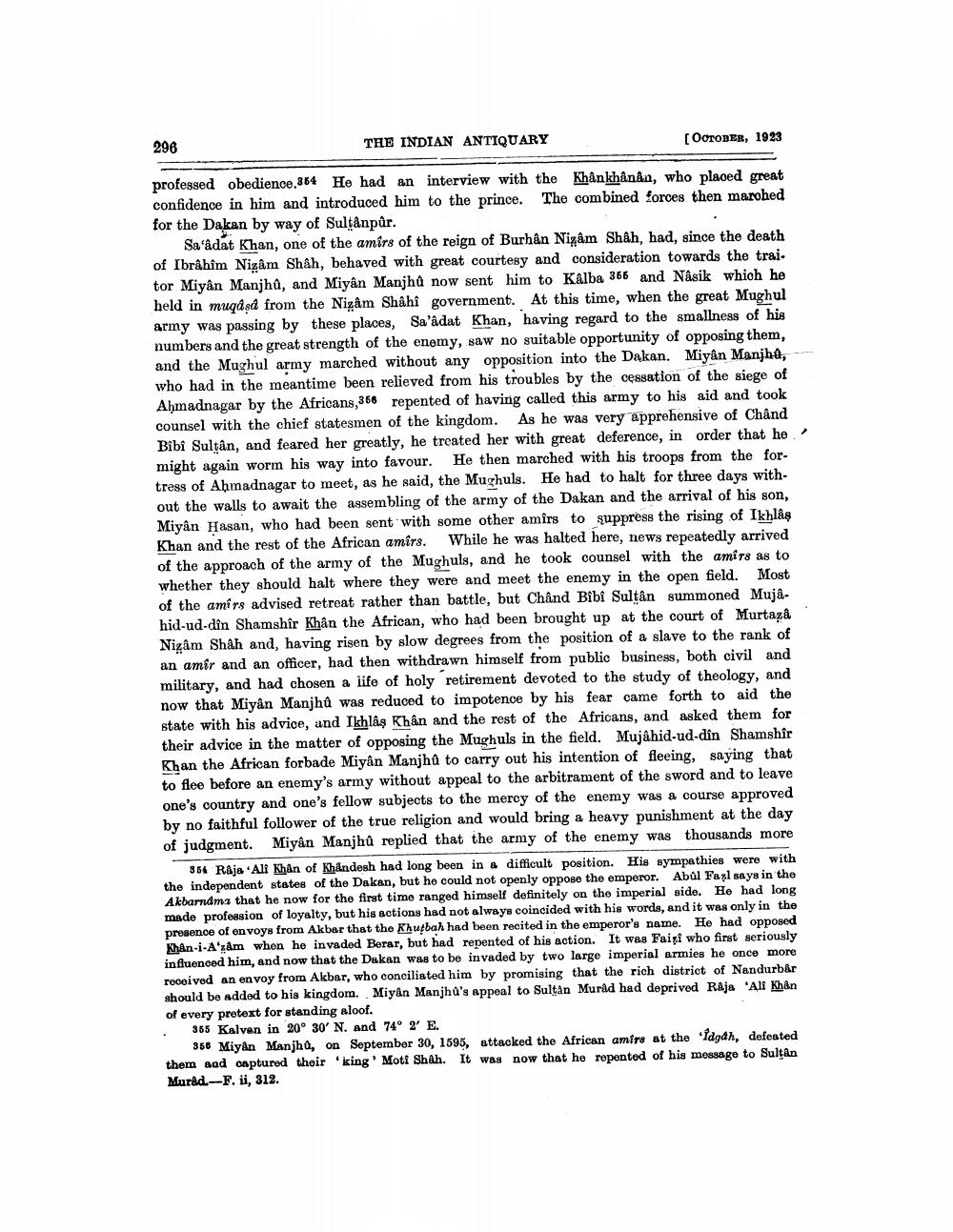________________
296
THE INDIAN ANTIQUARY
[OOTOBER, 1923
professed obedience,864 He had an interview with the Khân khânân, who placed great confidence in him and introduced him to the prince. The combined forces then marched for the Dakan by way of Sultánpûr.
Sa'adat Khan, one of the amirs of the reign of Burhân Nizâm Shah, had, since the death of Ibrahîm Nizam Shah, behaved with great courtesy and consideration towards the trai. tor Miyân Manjhû, and Miyân Manjhù now sent him to Kalba 366 and Nâsik which he held in mugásd from the Nizam Shahi government. At this time, when the great Mughul army was passing by these places, Sa'adat Khan, having regard to the smallness of his numbers and the great strength of the enemy, saw no suitable opportunity of opposing them, and the Mughul army marched without any opposition into the Dakan. Miyan Manjha, who had in the meantime been relieved from his troubles by the cessation of the siege of Ahmadnagar by the Africans, 366 repented of having called this army to his aid and took counsel with the chief statesmen of the kingdom. As he was very apprehensive of Chånd Bibi Sultân, and feared her greatly, he treated her with great deference, in order that he might again worm his way into favour. He then marched with his troops from the fortress of Ahmadnagar to meet, as he said, the Mughuls. He had to halt for three days with out the walls to await the assembling of the army of the Dakan and the arrival of his son, Miyân Hasan, who had been sent with some other amîrs to suppress the rising of Ikhlâş Khan and the rest of the African amîrs. While he was halted here, news repeatedly arrived of the approach of the army of the Mughuls, and he took counsel with the amirs as to whether they should halt where they were and meet the enemy in the open field. Most of the amire advised retreat rather than battle, but Chând Bibi Sultân summoned Muja. hid-ud-din Shamshir Khân the African, who had been brought up at the court of Murtaza Nizam Shah and, having risen by slow degrees from the position of a slave to the rank of an amir and an officer, had then withdrawn himself from public business, both civil and military, and had chosen a life of holy retirement devoted to the study of theology, and now that Miyân Manjhû was reduced to impotence by his fear came forth to aid the state with his advice, and Ikhlâs Khân and the rest of the Africans, and asked them for their advice in the matter of opposing the Mughuls in the field. Mujahid-ud-din Shamshir Khan the African forbade Miyan Manjhů to carry out his intention of fleeing, saying that to flee before an enemy's army without appeal to the arbitrament of the sword and to leave one's country and one's fellow subjects to the mercy of the enemy was a course approved by no faithful follower of the true religion and would bring a heavy punishment at the day of judgment. Miyân Manjhû replied that the army of the enemy was thousands more
354 Raja Ali Khan of Khandesh had long been in a difficult position. His sympathies were with the independent states of the Dakan, but he could not openly oppose the emperor. Abul Fazl saya in tho Akbarndms that he now for the first time ranged himself definitely on the imperial side. He had long made profession of loyalty, but his actions had not always coincided with his words, and it was only in the presence of envoys from Akbar that the Khutbah had been recited in the emperor's name. He had opposed Khan-i-A'zam when he invaded Berar, but had repented of his action. It was Faisi who first seriously influenced him, and now that the Dakan was to be invaded by two large imperial armies he once more received an envoy from Akbar, who conciliated him by promising that the rich district of Nandurbår should be added to his kingdom. Miyan Manjhu's appeal to Sultan Murad had deprived Raja 'Ali Khân of every pretext for standing aloof. - 365 Kalven in 20° 30' N. and 74° 2' E.
356 Miyan Manjha, on September 30, 1595, attacked the African amfrs at the 'Idgah, defeated them and captured their 'king' Moti Shah. It was now that he repented of his message to Sultan Murad.-F. ii, 312.




